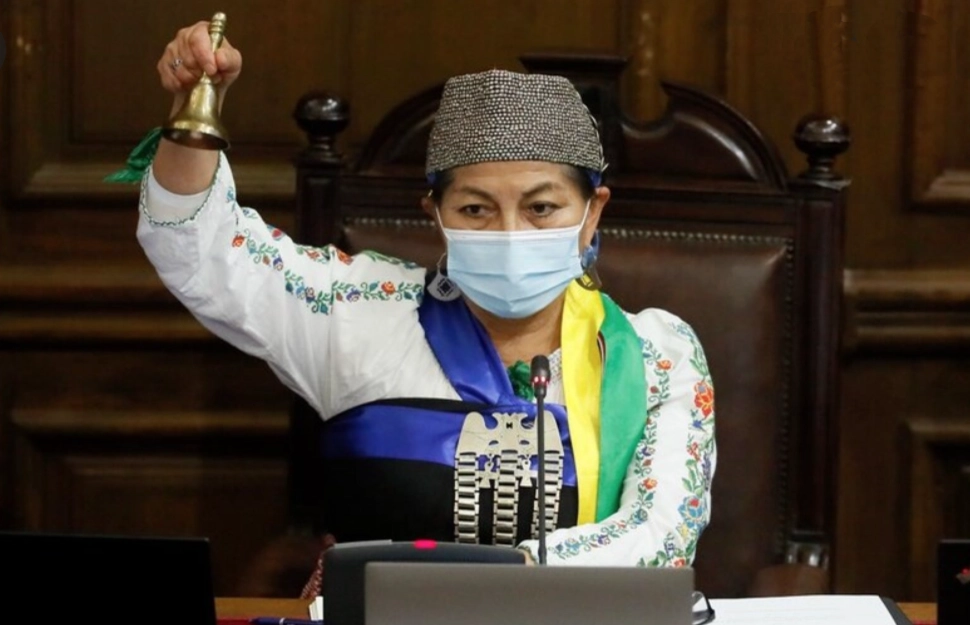This week, the Constitutional Convention formally requested an extension to work on the draft of the constitutional text for three more months. This came as no surprise to anyone as such a request was already priced in since the initial working plans. What was more surprising was that the Convention’s plenary approved by a vote of 115 votes in favor, or 75%, and 34 votes against, or 25%, that “Chile is a Plurinational and Intercultural State that recognizes the coexistence of diverse nations and peoples within the framework of the unity of the State”, according to the extract of article 4 on the political system, Government, Legislative Power and electoral system.
At the same session it was also approved that “pre-existing indigenous peoples and nations, as well as their members, are entitled to the full exercise of their collective and individual rights by virtue of their self-determination”, according to the excerpt from Article 5 on the political system, government, legislative branch and electoral system.
This recognition isn’t trivial. It is the result of decades of indigenous organizations struggling to make visible the situation of lack of protection and subordination in which they find themselves. This formal recognition of the plurinationality of the State would be a direct blow to that internal colonialism that Pablo González Casanova described decades ago about the situation of the continent’s indigenous peoples. From its inception, the Constitutional Convention represented a qualitative change in the country’s political representation, instituting that there should be diversity and inclusion, i.e., gender equity and available seats reserved for indigenous peoples.
Regardless of the lateness in the ratification of reserved seats, or the fact that they wouldn’t necessarily have a fair representation of the indigenous population in the country, the fact is that 17 indigenous representatives of all peoples were elected, including the Mapuche representative Elisa Loncon, who was elected President of the Constitutional Convention.
This situation is diametrically opposed to the entire republican history of Chile, where only on rare occasions, representatives of indigenous peoples were appointed or reached elected positions of relevance, considering that they were always relegated to a secondary role. That was a clear sign of an asymmetrical relationship in which the inclusion of their demands, needs or worldviews weren’t part of the Chilean nation-state.
The constitutional process isn’t finished yet and there is still a long way to go. After having been discussed in committee, plurinationality passed to the plenary and was approved. This allows the topic to become an integral part of the draft that will be presented for its approval in what is known as the exit plebiscite. That must be held approximately 60 days after the final text has been completed.
The consensus in the Constituent Assembly regarding this new paradigm was broad and clearly surpassed the two-thirds of votes required for the plenary to approve any article. However, criticism from conservative forces, both inside and outside the Convention, hasn’t gone away. With arguments often plagued with falsehoods, these conservative groups are trying to influence—they cannot eliminate these articles from the draft any more—a rejection of the text in the exit plebiscite.
In a simple way to explain, the strategy that the conservative right has followed was to refuse the conformation of the Convention (voting rejection in the plebiscite that gave rise to the process); to defend the quorum of 2/3 because it had been approved in the election; to carry out a disruptive work of its elected Convention members; to use the fallacy as a political tactic; to state in the media that the Convention is hegemonized by the left without leaving room for dissent; to assure that the 2/3 quorum is too low; to raise the possibility of adding a new alternative in the exit plebiscite, thus altering what was agreed and approved in the elections.
When plurinationality faces criticism, it is usually done with arguments based on fallacies, ignorance or both. The participation of indigenous representatives and the approval of different articles that enshrine their collective rights have led to the consideration that a constitutional text would be written for part of a minority or that this new constitution will be an indigenist one. This would imply, beyond all supreme ignorance, to use as an argument a concept that refers to a current of thought that was present in Latin America in the 20th century, where the States took care of the indigenous people but without them.
The truth is that the recognition of the plurinational nature of the State of Chile goes in the opposite direction. It leaves aside the paternalism and the colonial relationship that Chile has established with the indigenous peoples and elaborates, as a whole, a new Constitution that takes into account all of the above. It is a Constitution in which the State doesn’t do a favor by recognizing institutions or indigenous peoples, but rather they are an integral part of it, so that the country’s different institutions must adapt to this new paradigm.
Another accusation being made as part of the conventional debate regarding plurinationality and the autonomy of indigenous peoples is the intention to divide the country, create a parallel State or, directly, a secession. However, this new State is intended to be a counterpart to the nineteenth-century Chilean nation-State, a theoretical and empirical construction in which only the possibility of one State and one nation is imagined. Against this framework, the indigenous peoples are only a series of nations whose cultures, languages, cosmovisions, histories and subjectivities are dominated and made invisible or, in the best of cases, folklorized.
In other words, what is intended is an imagined community where all are present with their differences and autonomy, but as the Convention’s Rosa Catrileo pointed out during the debate in the Convention: “within the margins of the State”. At this point, however, it is undeniable that the social revolt seen in 2019 shook the foundations of the stagnant Chilean politics. Despite their own mistakes and conservative death throes, the work of the Constitutional Convention continues to move in the same trajectory, agenciating certain substantive changes such as parity and gender perspective, environmental protection and, by the way, plurinationality.
The latter is probably not a magic solution to all the problems or conflicts between the State and the indigenous peoples. However, it may represent a starting point to solve the endemic prosopagnosia in Chile, where we used to look at ourselves in the mirror and recognize our European ancestry, while consciously or unconsciously forgetting our indigenous roots.
It remains to be seen how plurinationality will materialize, since self-determination and the provisions of both articles must be implemented, and this will encounter resistance within the same uninational and monocultural State that has dominated for two centuries.
Translated from Spanish to English by Ricardo Aceves.













